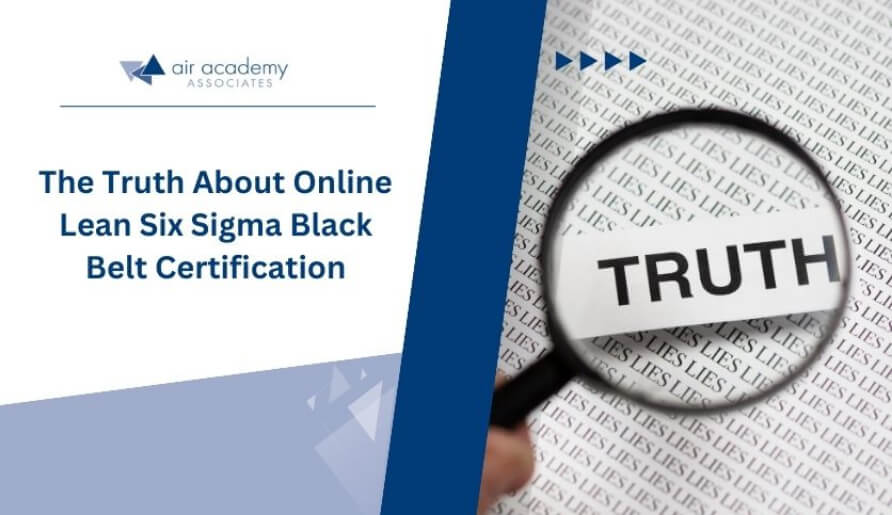
Lean Six Sigma has become an increasingly popular methodology for improving quality and efficiency in organizations across industries. As interest has grown, so have online training options for earning Lean Six Sigma certifications like the prestigious Black Belt.
Some myths and misconceptions persist about the legitimacy and value of virtual Lean Six Sigma Black Belt programs. This blog aims to dispel those myths and outline the benefits of quality online training options.
Why Lean Six Sigma? A Review
Lean Six Sigma is a proven approach for reducing waste and variation in business processes, leading to better productivity and quality. The Black Belt certification indicates deep knowledge and proficiency using Lean Six Sigma tools and principles to lead improvement projects.
Black Belt training was traditionally delivered in intensive live classrooms over four weeks or more. However, as remote work and learning have expanded, virtual programs provide a flexible and accessible option for certification.
Common Lean Six Sigma Myths Exposed
Despite the growth of online options, some skepticism remains about their quality and credibility. This distrust is unfounded mainly, from misunderstandings about online education, accreditation, and the knowledge testing process.
Myth #1: Online Training Lacks Rigor and Oversight

Image Source: Pexels
A common myth is that online Lean Six Sigma training lacks the depth and rigor of in-person programs. Many reputable virtual courses are offered through accredited universities and overseen by expert faculty.
For example, Air Academy Associates offers an accredited online Black Belt course with live lectures and discussions. Students interact closely with instructors and peers through features like video conferencing. Course materials are robust and developed by PhDs with decades of Lean Six Sigma expertise.
Quality Virtual Instruction
Another misconception is that online courses only provide passive, self-paced learning. In reality, many feature live instruction from seasoned Lean Six Sigma experts. Students can interact directly with faculty during lectures, ask questions in real-time, participate in group projects, and present findings – just as in physical classrooms. Some courses even offer access to on-demand instructor support outside of class. The virtual environment does not necessarily equate to passive or independent learning.
There is also a myth that online learning prevents peer collaboration. On the contrary, quality programs incorporate group projects, peer reviews, discussion forums, and tools like video breakout rooms to facilitate teamwork.
Developing communication and collaboration skills is integral to Lean Six Sigma training. A well-designed virtual course duplicates the cooperative environment of a physical classroom through modern learning platforms.
Myth #2: Online Certification Lacks Credibility

Image Source: Freepik
Another common misperception is that an online Black Belt certification holds less credibility and legitimacy in the business world. However, many major professional organizations provide credentialing exams that can be taken online or in person. Passing scores on these rigorous exams ultimately determines credibility, not the training delivery method.
Accredited Exam Options
Many globally recognized groups now offer accredited Lean Six Sigma certification exams in a virtual proctored format. These exams are standardized and secure, upholding the exact stringent requirements whether taken remotely or in testing centers. They grant professional credentials like the Black Belt, not the coursework itself. Virtual classes that prepare students for these high-stakes exams can be equally credible.
Real-World Application
There is also a misconception that online learners do not gain real-world application skills. In truth, quality programs integrate practical scenarios, projects, and simulations into the curriculum. Students can apply tools to case studies that mirror business challenges.
Additionally, most require the completion of process improvement projects in a live workplace environment. This hands-on experience is a core component of any Black Belt certification, online or in-person. Virtual courses provide the knowledge, practice, and application needed for professional success.
Myth #3: Online Learning Is Passive

Image Source: Freepik
Some assume remote learning is inherently passive or self-directed with little faculty interaction. However, today’s education platforms facilitate rich interactive experiences. As mentioned above, live video lectures allow students to engage with instructors and peers actively. Chat tools provide a means for clarifying concepts collaboratively.
Some courses even utilize interactive simulations to provide hands-on practice with core principles. Quality online programs combine self-paced learning with ample live touchpoints and social elements. This creates an active learning environment on par with physical classrooms.
Individual Support
Another belief is that online learners lack individualized support and feedback. In reality, virtual class sizes are often small, allowing instructors to connect directly with each student. Office hours and contact information enable students to get personalized assistance when needed.
Discussion forums also provide venues for peer feedback. Between live interactions, email access to faculty, and discussion boards, online learners have ample channels for clarification and support.
Engaging Media
Some think that online learning relies on boring slide decks or pre-recorded videos. However, modern courses leverage interactive media tools to engage learners. Short videos alternate with practice activities and live discussions. Gamification elements like knowledge-checking quizzes add interaction.
Virtual simulators allow hands-on learning by applying concepts in fictitious environments. The multitude of media available in eLearning settings can enhance student focus and interactivity compared to static lectures.
Myth #4: Online Courses Lack Networking Opportunities

Image Source: Freepik
One common myth is that online courses lack networking opportunities compared to in-person programs. However, reputable virtual Lean Six Sigma training providers recognize the importance of networking and often incorporate networking events into their programs.
Virtual Networks
Virtual networking events can include live discussions, group activities, and forums where students can connect and collaborate. These events allow students to expand their professional network, share ideas, and learn from others’ experiences. Additionally, online courses often have alum networks or LinkedIn groups where students can stay connected even after completing the program.
Professional Diversity
Furthermore, online courses attract diverse professionals from different industries and locations, offering unique perspectives and experiences. This diversity enhances networking opportunities and allows students to connect with individuals they may not have had access to in a traditional classroom setting.
Myth #5: Online Learning Is Less Effective

Image Source: Freepik
One of the biggest myths about online learning is that it is less effective than traditional in-person programs. However, numerous studies have shown that online courses can be just as effective, if not more so, than formal classroom-based learning.
Flexibility and Convenience
Online courses provide flexibility and convenience, allowing students to learn at their own pace and schedule. This can lead to greater engagement and retention of information. Additionally, online courses often incorporate interactive elements such as quizzes, simulations, and discussion boards, which can enhance learning outcomes.
Tailored Approach
Furthermore, online courses allow for personalized learning experiences. Students can revisit the material as needed, tailor their learning path to their needs and interests, and receive individualized instructor support.
It’s important to note that the effectiveness of any learning experience depends on the program’s quality and the learner’s commitment and effort. When a reputable online Lean Six Sigma training program is combined with motivated and dedicated students, online learning can be highly effective in acquiring new skills and knowledge.
Conclusion
While online options for earning Lean Six Sigma Black Belt certification have increased, some unfair perceptions remain about their legitimacy. However, carefully developed virtual courses from accredited providers offer the depth and rigor of any quality academic program. They combine self-paced learning with faculty instruction, peer collaboration, and real-world projects.
Students are well prepared for high-stakes credentialing exams that uphold standards defined by industry experts. Far from passive or self-directed, quality online programs leverage modern educational technologies to create an engaging and practical learning experience. Earning Black Belt certification online can equip professionals with in-demand process excellence skills – regardless of location.
At Air Academy Associates, we’ve been shaping Six Sigma leaders since the inception of this methodology. Join us now to enroll in our online Lean Six Sigma Black Belt course and start your transformation.


